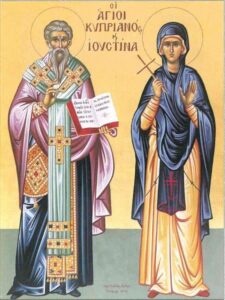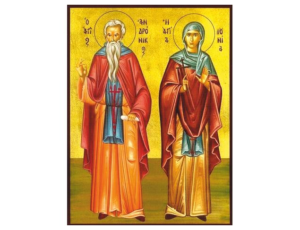Disciples Andronicus and Junia – May 17 I Of the Seventy and his fellow-laborer – Romans 16:7

Andronicus (Andronikos – man of victory; conqueror of men) is counted as one among the Seventy and was disciple of the Savior. He and his fellow-worker Junia are mentioned by St Paul in his Epistle to the Romans. “Greet Andronicus and Junia, my kinsmen and fellow prisoners, who are of note among the Apostles, who also were in Christ before me” (Romans 16: 7). This is the only reference to them in the New Testament writings.

Andronicus and Junia, fellow Jews who were in prison with me; they are outstanding among the apostles, and they became Christians in the early Church. Andronicus was said to be one of the Seventy Apostles chosen and sent forth to preach by Christ (Luke 10:1). They became Christians prior to the conversion of Saul of Tarsus. Thus, they may have been among those who saw the Risen Lord since an ‘apostle,’ by definition, was one who had ‘seen the Lord’ (1 Cor. 9:1)
Some, opine that a woman is mentioned as an Apostle, have attempted to translate “Junia” as “Junias,” a man’s name. However, the fathers are united in treating her as ‘Junia’. It may be that they were husband and wife, like Aquila and Priscilla (Acts 18), but the ancient witnesses do not tell us. Junia may have been imprisoned for her faith at some point before Romans was written, probably one of the first believers arrested for her faith.

Andronicus was made bishop of Pannonia and preached the Gospel throughout the whole of Pannonia together with Junia. Andronicus and Junia were successful in bringing many to Christ and in demolishing many temples of idolatry. They brought many pagans in Christ, by converting them to the knowledge of God. They closed many pagan temples and built Christian Churches in its place. The tradition holds that they were capable of performing miracles, by which they drove out demons and healed many of sickness and disease.
These two biblical figures are commemorated on May 17, by the Eastern Orthodox, Catholic Churches and some Oriental Orthodox Churches.
0 Comments